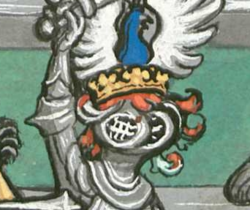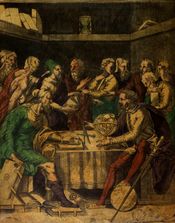|
|
You are not currently logged in. Are you accessing the unsecure (http) portal? Click here to switch to the secure portal. |
Ludwig VI von Eyb
| Ludwig Ⅵ von Eyb | |
|---|---|
 | |
| Born | 10 October 1450 Castle Sommersdorf, Germany |
| Died | 21 May 1521 Castle Hartenstein, Germany (?) |
| Spouse(s) | Margarete Truchseß von Pommersfelden |
| Relative(s) |
|
| Occupation |
|
| Influences | Nicholai de Toblem (?) |
| Genres | |
| Language | Early New High German |
| Manuscript(s) | |
Ludwig Ⅵ von Eyb “the Younger” (1450 - 1521) was a 15th-16th century century German knight. He was born on 10 October 1450 at Castle Sommersdorf in Bavaria, the son of Ludwig V “the Elder”. He was the second of four sons, of whom Anselm and Gabriel went on to gain notoriety in their own right. Though he does not seem to have attended the University of Erfurt like his brothers did, nevertheless his writings demonstrate a considerable level of education.
The first record of Eyb's activities as a soldier is in 1470, when he accompanied his father on a campaign in the Mark Brandenburg. In 1476, he made a pilgrimage to the Holy Land where he was knighted, and after his return he married Margarete Truchseß von Pommersfelden in 1478.
From 1479 to 1486, Eyb served as Steward to Wilhelm von Reichenau, Prince-Bishop of Eichstätt. Then in 1487 he entered the service of Otto II, Count Palatine of Mosbach-Neumarkt in the Upper Palatinate. He served Otto as Steward until the Countʼs death without issue in 1499, whereupon he was appointed Vicedom of Ottoʼs estate by Philipp “the Upright”, Elector Palatine of the Rhine. As further reward for his service, in 1503 Eyb received Castle Hartstein as a personal fief (it would later become a hereditary fief in 1509)
That same year, the Landshut War of Succession erupted, as Elisabeth took possession of the Duchy of Bavaria-Landshut upon the death of her father Georg, and Albrecht IV, Duke of Bavaria-Munich, rejected this and pressed his own claim under an inheritance agreement between the Wittelsbach branches. This was a difficult position for Eyb, who now owned estates in both duchies, but as his overlord Philipp supported Elisabeth, who was married to his third son Ruprecht, Eyb took to the field in 1504 in a major campaign. Despite a string of victories in which Eyb personally fought alongside his troops, ultimately the war was lost after Emperor Maximilian placed Elisabeth and Rupert under imperial ban and they died of illness.
From 1510 to 1512, he served as Steward to Friedrich I, Margrave of Ansbach and Bayreuth, administering the Mark Oberland at the Plassenburg above Kulmbach. After that, at the age of 62 he went into retirement at Castle Hartenstein. But this seems not to have agreed with him, because in 1518 he left retirement and returned to Friedrichʼs service as High Steward. He continued in this office until his death on 21 May 1521.
Eyb was an avid warrior, and his martial prowess was remarked upon by his contemporaries. He was a seasoned soldier and a member of the knightly Order of the Swan, and was also a member of the Tournament Society of the Unicorn and active in the tournament revival of the late 15th century. He authored multiple books on different sorts of warfare, including a war book in ca. 1500 (MS B. 26) and a tournament book in 1519 (Cgm 961; this text is significant in that it contains on of the few complete copies of the “1485 Tournament Regulations of Heilbronn”). He also seems to have written a craft book and a historical or genealogical work, but their contents and location are currently unknown.
The B. 26 is of particular interest, as it includes among other things both an expansion of Konrad Kyeserʼs popular treatise on siege warfare Bellifortis (“Battle Strength”) and a version of the fencing treatise known as die Blume des Kampfes (“The Flower of Battle”). Eybʼs work is the only currently known member of that group which contains detailed descriptive text as well as illustrations, and significantly the text is not translated from Liberiʼs own treatises.
Contents
Treatise
Additional Resources
The following is a list of publications containing scans, transcriptions, and translations relevant to this article, as well as published peer-reviewed research.
- None.

